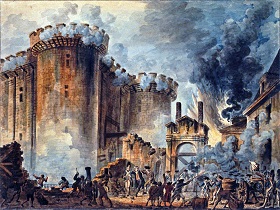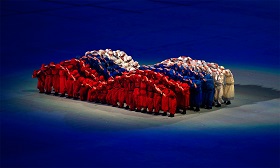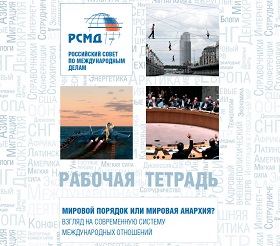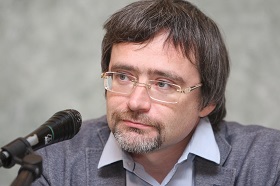Irina Khakamada: We Are Mature Enough to Play by Transparent Rules
(no votes) |
(0 votes) |
Irina Khakamada, one of Russia’s most prominent female liberal politicians, met RIAC website editor Maria Smekalova to share her views on the future of Russian liberalism, offer her scenario for resolving the Ukraine crisis and unveil the secrets behind negotiating successfully with foreigners.
Irina Khakamada, one of Russia’s most prominent female liberal politicians, met RIAC website editor Maria Smekalova to share her views on the future of Russian liberalism, offer her scenario for resolving the Ukraine crisis and unveil the secrets behind negotiating successfully with foreigners.
As an outspoken liberal, how would you define liberalism, which seems quite a vague notion? Do you see any Russia-specific traits or is it universal?
Pure liberalism is something that does not exist in any country, since it is less associated with a political regime and is more a philosophy proclaiming the supremacy of human natural rights and liberties. You understand that it is strange to believe that a person is born with the natural right to free speech and free thinking, with the natural right to religious belief and private property.
The idea was developed by liberal philosophers, by Thomas Jefferson and others. Since the state has always been an oppressive institution, this model was countered by liberalism, which declares such universal and fundamental values as separation of powers, an independent judicial system, free media, private property, the right for all societal opportunities, etc. Each country implemented the philosophy in its own way, i.e. depending on nationality, geography and the relevant historical period, which shaped national models built to a liberal and democracy-oriented pattern. Hence, although the principles of liberalism appear basically universal, the real-life models of the United States and Great Britain sharply differ from the continental versions of France, Italy and Spain. The Japanese and Indian systems markedly diverge from their Western counterparts. But they all represent liberalism.
Is Russian liberalism a reality?
When some say that liberalism in Russia has exhausted its historical resources, remember that there has never been a Russia-adapted model. The 1990s brought in libertarianism materialized within a free market, appropriate institutions and a constitution, although presidential powers were barely balanced by the parliament. In 1993 we saw the parliament shelled, and after 1996 the model displayed all its capacities and limitations. The oligarchy and monopolies outpaced competition, SMEs were fragile, and the media was dominated by big money. All that time, democratic institutions were withering, so that finally Russia obtained a mixed model combining authoritarianism and an imitation of democracy.
Can Russia become a liberal state? Is there really such a need?
I see both the need and the potential. Singapore notwithstanding, highly-developed and geographically spacious economies tend to take the liberal democratic route and show progress despite crises. Of course, there is China. But it is an Asian actor with a specific mentality. Confucianism and the Chinese tradition differ from the Russian tradition. The Russian people are pro-European. Our tsars, the court and the elite are known to have favoured English and French over Russian. Peter the Great did his bit. Why should we give up our roots? We are neither Saudis nor Chinese, and our mentality brings us closer to Europe. It is difficult to judge the extent to which people are ready for liberal reforms. It is a classic chicken and egg problem: the government thinks the people are not ready to live according to transparent rules and fear must be used for control, while I think the people are mature enough and are being artificially held back.
While free market seems the key mover, Russia is being overwhelmed by government corporations. Does it run counter to the free economy basics or do they form part of the system?
Of course, there is a contradiction. Having a PhD in economics, I proceed from this fundamental education, Karl Marx included. My dissertation proclaimed that any monopoly and state interference, on the one hand, presents a natural process, while on the other, must be restrained. We need a balance between the neoclassical model and Keynesianism that insists on a stronger state, printing more money and job creation. At the same time, the neoclassical model proffers less state interference and offers more freedom to market forces. I believe that today’s state companies are violating all market laws, whereas the periodic intervention of the state in their doings is absolutely ineffective, especially in Russia where SMEs remain weak. In all "normal" countries from the United States to Italy it provides from 50 to 80 percent of jobs, with 50 to 70-percent participation in generation of the GNP. In Italy, this figure is 70-80 percent, and 50 percent in the United States, where there are many big corporations. In Russia the figure stays consistently at 12-15 percent, which is strange. While the small and medium sized businesses are working hard to create an anti-crisis cushion, surviving any calamity by shifting tactics and strategies, Russian state-owned giants may thrive on oil and gas in the absence of competition and in dire straits are bailed out by the government. The state budget is predominantly used to prop up their ‘Ponzi schemes’, which collapse after they irresponsibly take out huge credits. All these bring disaster because state corporations are gigantic and clumsy, with highly rigid management. Hence, a monopoly may exist only if it is natural, i.e. when private business finds some activity a loss but the society cannot go without it. However, the state must control both the monopoly and its tariffs. But Russian monopolies and state corporations have grown used to simply jacking up prices, killing national industries.
What about liberalism in international relations? Democracies are believed not to go to war against each other? Do you think that’s true?
Advanced democracies only do not fight one another. But the United States got stuck in Vietnam and Iraq, and has also produced a host of conflicts that remain unquenched for many years. There are two reasons for democracies to coexist peacefully. First comes nuclear containment. Second, electorates are sure to sweep out regimes willing to fight other democracies, since nobody wants to challenge an equally strong adversary. All sides understand that the toll will be too much to bear.
Does the economic interdependence of countries raise or lower the risk of war?
Of course the risk is lower if interdependence is based on free trade and balanced production. But a conflict is highly likely to arise if a stronger state supplies others with dirty technologies and ineffective processes. If you try to equalize the trade terms on the EU pattern, relations will remain relatively stable, although disputes may occur.
Women tend to frequently become foreign ministers. Why is this? What is it about international relations?
Only because women want that kind of involvement in international relations. They are sick and tired of wars, conflicts and weird ambitions. Who has been shuttling more than others between the various different sides of the Ukraine crisis? Angela Merkel. She has been the only one to fight to the last ditch.
What kind of stance do you deem appropriate for Russia in the current situation? Could you offer you own solution?
First, the Donetsk and Lugansk regions must become autonomous within Ukraine. They hate the word federalization, so we can put that to one side. Women are more understanding and flexible, so let's name the process regionalization.
Russian speakers must feel safe and free to use their native language, with access to both Ukrainian and Russian TV channels. If the Normandy agreements are to be implemented to the letter, there will be enough political will to put an end to this plight. The process must be free from provocation and logistical and military support for radicals on both sides. Both Russia and the United States should calm down: Moscow should wind down the Crimea issue and Washington should stop fanning the flames. This would only help the Europeans in their peacemaking.
Second, highly complicated talks are needed in order to see Crimea’s status within Russia legitimated. For example, it could be an Alaska-style purchase. Ukraine's crippling debts could be written off. Russia might give Ukraine more money or cut gas prices. Another referendum, this time under OSCE auspices could be held as proposed by Grigory Yavlinsky, to make sure that the Crimeans would never return to Kiev rule, and then Russia should financially compensate the loss. I cannot believe that a civilized society in the 21st century is unable to use the UN Security Council and legalize Crimea's presence within the Russian Federation. We live in times of turbulence and chaos – is there really any need to make things worse? We must show civility and refrain from playing the Crimea and Ukraine cards. I beg Russia and America to stop doing so for the sake of their national interests, if nothing else.
Third, if Ukraine’s leaders are really responsible for their future, they need to try to stabilize the situation and stop rushing to try to get NATO membership. And if Russia really wants peace, it should unblock Ukraine's path to the European Union.
Are there reliable media outlets in this information war? Where do you get your news?
I read the Nezavisimaya Gazeta and Vedomosti dailies, watch DozhdTV channel and listen to Echo of Moscow station. I also read the FaceBook and other web pages of sensible users that now seem rather tricky to find. You can read pieces reposted from Snob magazine or Interfax agency, as well as TASS on major events, because these agencies would not invent things. Of course, it is best to keep well away from murky and tabloid sources, as well as Russian and Ukrainian radical trolls. A relatively unbiased picture comes from comparing different sources. Just take the New Times of Eugenia Albats and Kommersant VLAST. They are set on exactly opposite sides. Compare them both and try to find the truth.
Can Russians perceive information analytically or do they prefer to drift along?
I don't think they really can. The territory is huge and the people are not really curious enough to seek alternative sources. Except for Moscow, St. Petersburg and other big cities, the population is simply reliant on federal media, and therefore receives an incomplete and frequently biased picture, which they seem to find sufficient.
You must have held lots of negotiations with foreign entrepreneurs. How do they perceive Russian business? Have you seen any sort of prejudice?
First of all, foreigners are just happy to deal with Russians in the hope of swindling, in the belief that Russians are rich and silly idiots and make easy prey. This point was superbly illustrated by the ORT TV channel in its documentary on Ilya Kabakov, the only Russian painter who has adapted to the West to sell his works at top prices. Second, many believe that all Russians are Mafiosi and gangsters. Negotiating is a difficult affair, as you must create a positive image. If you are not that good at foreign languages, take an interpreter to avoid distortions. Third, you must have a good command of your counterpart's law, something many Russians fail to comprehend. Never rely on a lawyer, because it is only you who must understand their laws and how they work.
The heart of the matter seems to lie in understanding the partner's mentality. Speaking with the French, never grasp the nettle. Start with praising France, it wonderful cuisine and wines. Invariably break for lunch at half past twelve, join the partner and meticulously pick the restaurant and the menu, because they regard both time and the process itself as sacred. Have modest but expensive clothes and car, with costly watches totally inadmissible. The French like people looking humble but emanating the smell of money.
Italians would like you to be dressed up in bright colors, since they love that kind of display themselves. To begin with, joke and talk nature, Italy, women and sex, and only then state your business.
Facing Americans, make sure your clothes are appropriate and inexpensive, although something should hint that you are well-off. Get down to business straightaway and pragmatically demonstrate their interest in the project in maximum 15 minutes. If you fail, this is a flop, because Americans don't care about lunches and your suits. The same goes for the Germans.
In other words, empathize internationally. Talking to foreigners, pretend to forget about your interests and rather try to dissolve into their realities in order to identify yourself with their character and ride their wave. Only then can you expect recognition and trust.
(no votes) |
(0 votes) |







